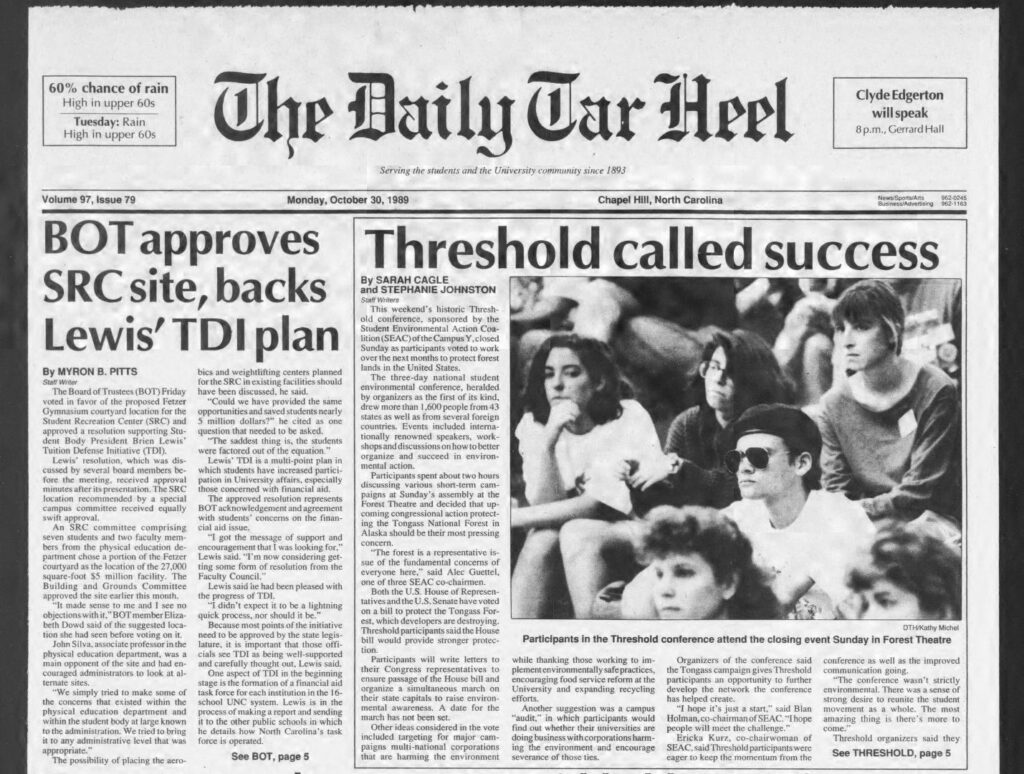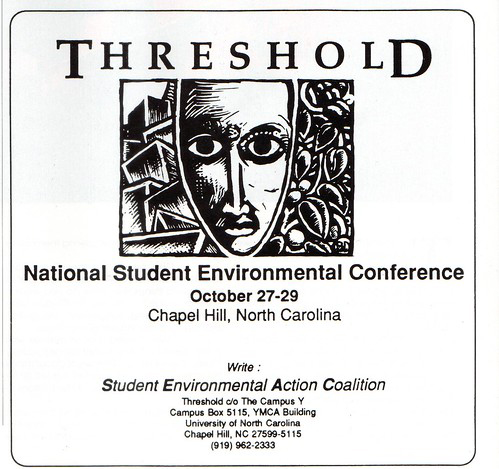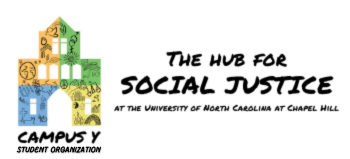
In 1988, the Student Environmental Action Coalition (SEAC) placed an ad in the classifieds section of Greenpeace magazine to connect with other students interested in working on environmental issues. Almost 200 campus-based environmental groups replied and, less than a year after placing the ad, SEAC’s leaders found themselves planning the first student-led environmental conference in the country.
Over the summer of 1989, SEAC member Jimmy Langman came up with a plan. He wrote grants, recruited the nation’s leading environmental advocates, and collaborated with students from across the country. By the time students returned to campus in the fall, Langman had organized an entire conference. Environmentalist David Brower was coming. Senator Terri Sanford was coming. The Indigo Girls were coming. And more than 1,600 students from across the country were coming – all in less than three months.

“If you build it, they will come,” Lisa Abbott (’92) said in an interview for the Campus Y’s Oral History Project in 2010. Abbott helped SEAC organize the Threshold Conference in the fall of 1989. “I got very involved in the nuts and bolts – like how do we set up a database to register students, how do we get word out…where do they sleep, how do we feed them?”
Working 40 to 50 hours a week on the conference’s logistics, Abbott and the rest of SEAC matched everyone attending the conference with a host family or host student. When the Threshold Conference began, they were more than ready for everyone who showed up.
For three days, students and environmental leaders workshopped and developed SEAC’s first national campaign to save America’s forests and reform the U.S. Forest Service.
“It was just so inspiring,” Abbott said. “Out of that [conference], came the determination to create a national SEAC organization and to create a structure that allowed students on lots of different campuses to be a part of shaping agendas and helping with national strategies.”
It didn’t take long for attendees to get to work. Two weeks after the Threshold Conference, students from 50 different schools organized a day of action where they demanded that their universities take on environmental sustainability initiatives. Three months after the conference, they organized marches at state capitals for policies that would conserve America’s national forests. Five months later, they held a SEAC rally for national clean air laws in Washington, D.C. A year later, they organized a second environmental conference, this time at the University of Illinois. More than 7,000 students registered from all fifty states and 11 different countries.
Since the first Threshold conference in 1989, SEAC has remained involved in environmental and political issues across the United States. They organized the Action for Solidarity, Equality, Environment and Development (A SEED), which was an international effort to influence the Earth Summit in Rio. SEAC also launched an Environmental Justice Initiative (EJI) to educate high school students and developed Threshold, a national environmental magazine. They even successfully pressured Home Depot to stop selling old growth wood.
Two short clips of speakers kicking off the Threshold Conference on October 27,1989.
Even though SEAC disbanded as a national organization in 2014, there are still campus-based SEAC groups across the world, from California to Nigeria to North Carolina.
Today, UNC’s SEAC organization is subdivided into different committees that focus on specific environmental issues. One of the most active sub-committees is working with the Center for Biological Diversity, which is suing UNC for its outstanding coal use. The sub-committee is writing its own petition against UNC’s use of coal power plants and looking into the effects of coal ash on Chapel Hill and the surrounding community. SEAC also promoted UNC’s recent Climate Strike, which took place on September 20, 2019 and attended neighboring strikes both in Chapel Hill and Raleigh.
“Students are, at a national level and in this state, fueling a really exciting movement around climate justice and economic justice,” Abbott said.
Abbott is now the Deputy Organizing Director for Just Transition at Kentuckians for the Commonwealth, where she works on sustainable energy and climate change. When asked what advice she would give students looking to become involved in social justice work, she only had four words: “Just go for it.”
